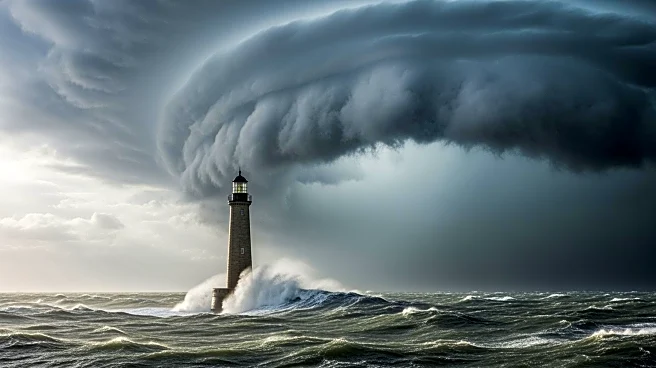What's Happening?
Hurricane Melissa has intensified into a Category 4 storm, posing a significant threat to Jamaica and Haiti with expectations of catastrophic flooding and torrential rain. The National Hurricane Center
(NHC) has issued advisories indicating that the storm is moving northwest through the Caribbean Sea, directly targeting Jamaica. The storm's progression is expected to bring 15 to 30 inches of rain to Jamaica and the island containing Haiti and the Dominican Republic, with some areas potentially receiving up to 40 inches. This heavy rainfall is likely to result in life-threatening flash floods and numerous landslides, isolating communities and causing widespread power outages.
Why It's Important?
The intensification of Hurricane Melissa into a Category 4 storm is a critical development for the Caribbean region, particularly for Jamaica and Haiti. The potential for catastrophic flooding and landslides poses a severe risk to infrastructure, homes, and lives. The economic impact could be substantial, with disruptions to local economies and potential long-term recovery efforts required. The storm's impact on agriculture and tourism, key industries in these regions, could lead to significant economic losses. Additionally, the humanitarian response will be crucial in addressing the needs of affected populations, including shelter, food, and medical care.
What's Next?
As Hurricane Melissa continues to strengthen, emergency response teams in Jamaica and Haiti are likely to be mobilized to prepare for the storm's impact. Jamaica has already activated 650 shelters in anticipation of the storm. The focus will be on evacuating vulnerable areas, securing infrastructure, and providing resources to mitigate the storm's effects. International aid and support may be necessary to assist in recovery efforts post-storm. Monitoring the storm's path and intensity will be crucial for timely updates and response strategies.
Beyond the Headlines
The intensification of Hurricane Melissa highlights the increasing frequency and severity of natural disasters in the Caribbean, potentially linked to climate change. This event underscores the need for improved disaster preparedness and resilient infrastructure to withstand such storms. The long-term implications may include policy shifts towards sustainable development and climate adaptation strategies to protect vulnerable communities.









